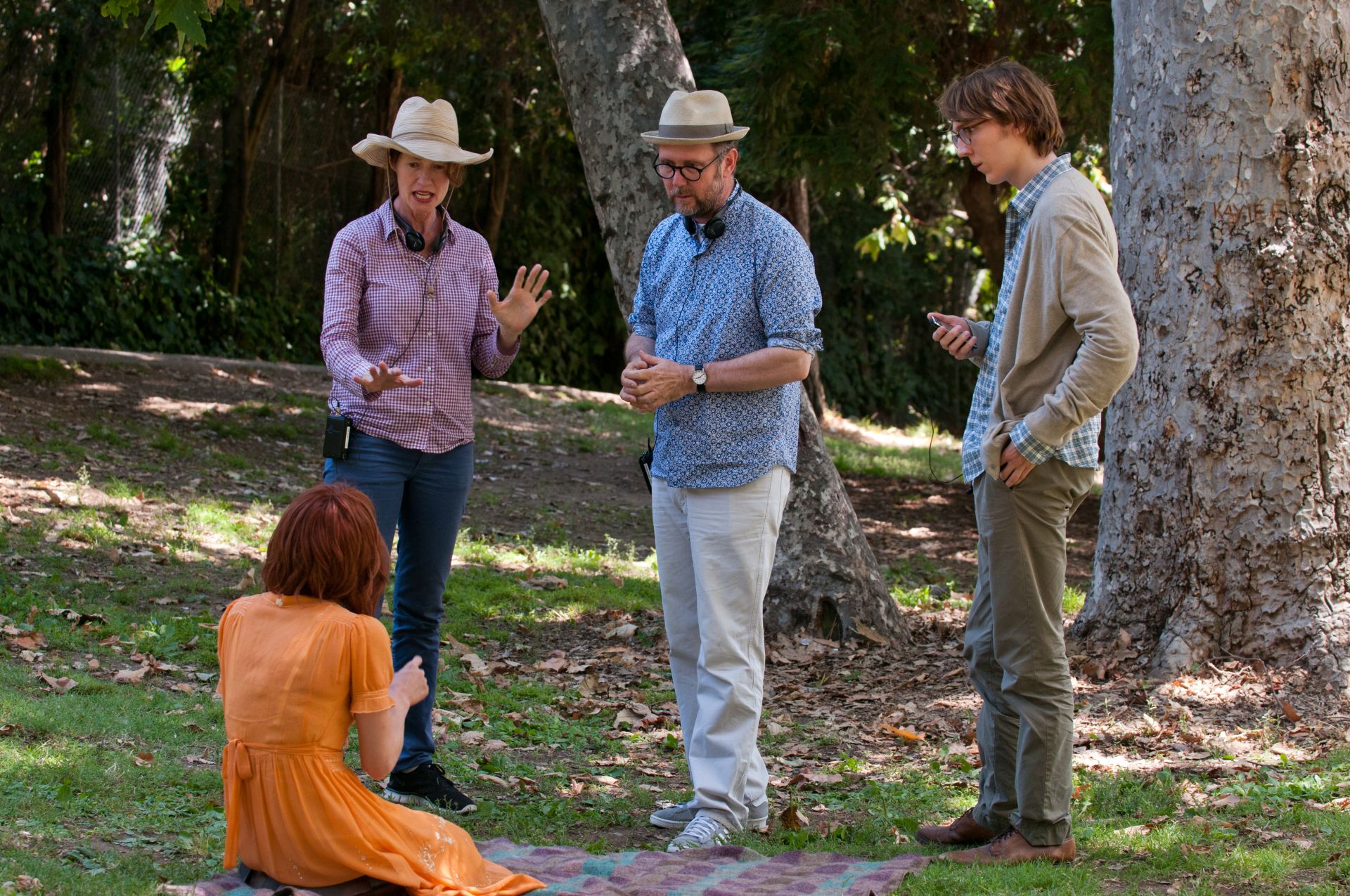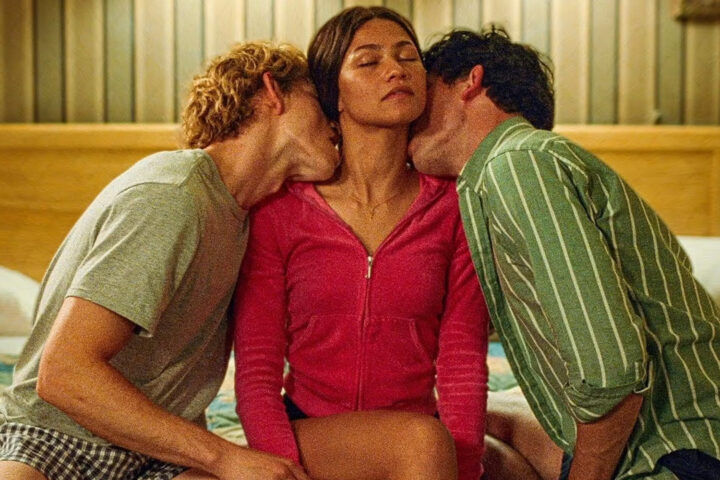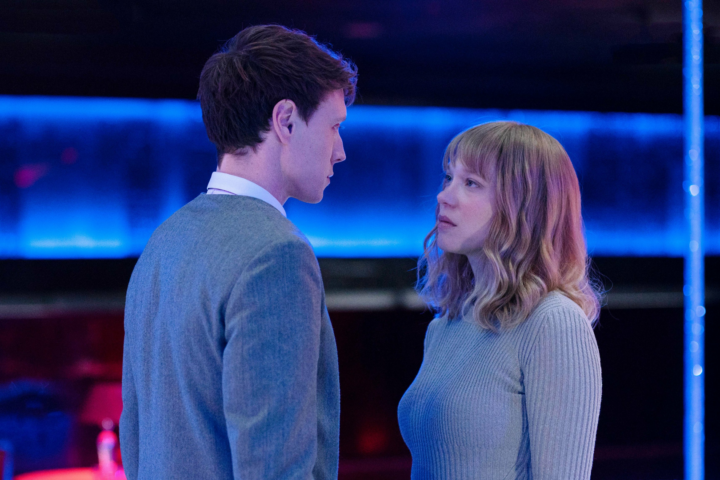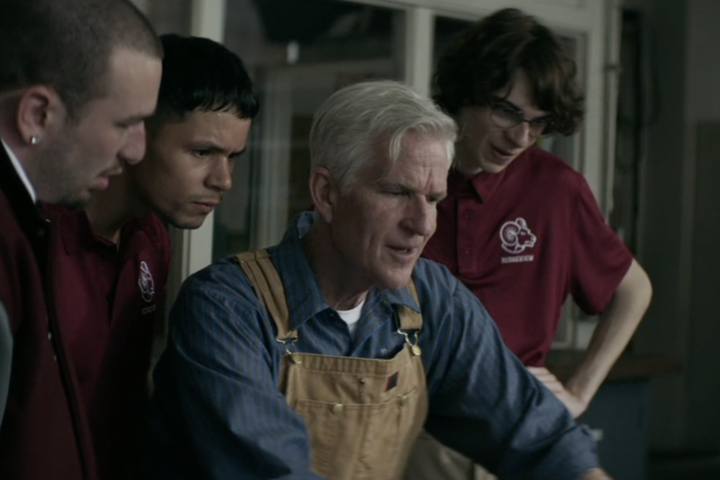You have to hand it to Ruby Sparks’ directors Jonathan Dayton and Valerie Faris, partners in life raising a family, working fourteen-hour days together on set and then going home to dinner and teenagers before going right back to work together—apparently their secret formula for making terrific movies.
The pair, veteran music video and commercial directors who hit the film world big time in 2006 with a not-so-little movie named Little Miss Sunshine, which went on to an Oscar nomination, are a simpatico tandem of insights, humor and marked substance in a business where scores of directors-for-hire set their sights on the fast cash grab of opening weekend. Not these two—small movies about big things are their specialty, and Ruby Sparks is no exception.
They also only work on projects that inspire their personal passions, hence their six-year absence from directing. When actress/writer Zoe Kazan brought them her screenplay for Ruby Sparks, they knew they had a winner in the story of an insecure young novelist who manifests his dream girl, which might sound like a fantasy come true, but plays like a catalog of comic relationship insecurities manifested instead.
I caught up with Jonathan Dayton and Valerie Faris recently to discuss Ruby Sparks’ imaginative story and how it gets to the truth of our fears and foibles in relationships and the personal and working dynamics of their relationship, the engine behind one of the summer’s very best movies.
After the success of Little Miss Sunshine, you didn’t direct a film for six years.
Valerie Faris: Right.
Jonathan Dayton: We worked on films continuously. Little Miss Sunshine was such a rewarding experience that it was hard to think about coming back with anything that we loved less. And we loved all of the films that we worked on, but we didn’t feel they were ready. And this was the first one where all of the elements came together. Making a movie is two years of your life, and you better love it and feel like it is saying things that you want to say and things that are meaningful to you.
VF: You’re going to talk all about it and face all of the people that you know and respect. You just want to be able to come out with something that is hopefully generating an interesting dialogue and has something to offer film audiences. There are a lot of films out there that don’t do that.
JD: So I am really happy that we have two films now as different as these two, but they still share certain qualities that we will always try to have in our films.
VF: We are very script oriented, so we like to get them to a place where we feel like we can see the whole film in our heads before we start shooting. Even though in both cases somebody else wrote the scripts, we feel like we are the authors of the film. It is still coming from us. You have to feel at every point that it is working.
JD: Like with this one, we knew that Zoe had to become an actress and focus on her performance and she could not really write anymore.
VF: We didn’t want her going back home and night trying to work on the next day’s lines.
JD: So we worked really hard with her to kind of rework the material and get it to where we felt it was ready.
Here we have a movie with a fantastical premise. I love the fact that near the end of the film Calvin says to his therapist, played by Elliott Gould, ‘I don’t know why. I can’t explain it.’ Yet despite the fantasy, it talks about all of these things that are truths in our relationships. It’s really a human comedy in the guise of a situational set-up.
VF: Yes. It really is about our relationship with art and the urges we have to control and the way we are, both in our relationships to our partners and our work. What we liked was that there was this parallel to creativity and love.
JD: And the creative process. I think every relationship contains some fiction. We have an impression of who our partner is and a portion of that isn’t actually true, but we need to believe certain things.
VF: And even about ourselves. There is an element of fiction in the idea of a person versus who they are. It’s hard to say where the idea and the real person begin and end. We felt like this story explored very complex themes and issues. But it is also told in a very matter-of-fact simple fashion. I loved Eternal Sunshine (of the Spotless Mind), but at times it was like, ‘Okay, where are we again.’ And I loved that. We wanted this to be a story that you got completely caught up in emotionally while exploring these themes.
Ruby did have a similar effect on me as Kate Winslet did in that picture. She was enigmatic and unpredictable; easy to fall for. As in Eternal Sunshine, we wonder how much is she in Calvin’s mind. We are seeing her as he sees her, at least initially.
VF: Right. But then she develops this will of her own, which complicates things.
Speaking of her performance, I was fascinated by the number of characters that come out of her in the film. Every time I got comfortable with one, there would be another. I missed the original version when she was gone.
VF: It’s painful.
I spoke with her a bit about what I call the “big” scene, which I think is truly special many respects. Can you give me your thoughts on that? The film is rather comic to that point, but the relationship has to go to the logical conclusion.
VF: Yes. Exactly.
JD: And I appreciate you protecting what happens there, but it certainly… Well, go ahead…
VF: That scene was part of what drew us to this material. We had seen this story in different versions before and we felt like this had the potential to go to a more interesting, deeper emotional place and take it to its logical extension. It wasn’t something that was completely fleshed out in the script and was something that was hard to exactly write out. It was hard for Zoe to write out because it is the most painful, challenging scene in the movie. So it was something that we did the most work around in preparation for the movie. We rehearsed it with other actors because we didn’t want to put (Paul and Zoe) through it and have them think about it too much beforehand. We tried stuff with each other. We would work out that scene. It was fun.
JD: That’s the benefit of having two directors. They can actually act out scenes.
VF: Like what does it feel like if you have to do everything you are told to do with no resistance? You have to completely surrender to the person controlling you. We played around with it, but it really wasn’t until we shot it at the very end of the shoot, after we went through all of the Calvin and Ruby relationship , that we knew what that scene had to be. So that morning we made a list of the things that he was going to make her do and ran it by Zoe. We said, ‘These are the things he is going to tell you to do and we are going to give them to you in this order. He is going to give you these commands.’ And we ran them through the whole sequence, and each take was about ten minutes. It was very interesting. We shot her side first, so Paul got to see. He didn’t have a vision of what this scene was going to be either. We shot her side first so he could really feel what he was putting her through, and that was really important to us. When you see Paul’s side of it, it’s really hard for him too. He’s not enjoying what he is going through.
JD: It was important for us that the scene ultimately be about inflicting pain on himself as well as her. It was about showing that this relationship was untenable at that moment.
VF: It’s not possible to sustain this relationship any longer under the circumstances. Really, once he crosses that line and decides to do the slightest change, he can never get it back again.
But the film does believe in love and its possibilities. I don’t want to give too much away. But to me, it said that no matter how far you have gone, no matter what you have been through and no matter what places you have taken each other, if you truly love each other then there is another chance.
VF: Right!
JD: Yes. I appreciate you saying that. I think that is really important and I am glad. I don’t think everyone sees it that way. But that is certainly how we intended it. In the end of the movie, we don’t know what is going to happen next, but there is a ray of hope and sense that Calvin is a better man, and there is reason for hope.
VF: He has confronted his demons. There is a lot more damage that can be done by denying those parts of yourself. And I think Calvin really faces this ugly part of himself and comes through it changed. We don’t answer whether everything is going to be hunky dory or not, but it gives you the possibility of change.
You have worked with Paul twice. What do you appreciate about him?
VF: This movie shows Paul’s humor, which we love about him and which he doesn’t get to show very often. You really see his physicality in this movie, which I love. He puts himself out there in a way that not all actors do. He likes to be challenged, and we were excited about him being in the role of the leading man.
JD: He reminds me of how Dustin Hoffman, in his early roles, could do anything, but he wasn’t your traditional Hollywood leading man. Paul really is that and I think this is a side of him that people have not seen.
Of course you have seen him in L.I.E., which was unbelievable given his age at the time.
VF: Yes. We saw that before we auditioned him for Little Miss Sunshine, and we were blown away how for his age it was such a challenging, difficult part. And in Little Miss Sunshine he was so great to work with. For someone who didn’t have dialogue in the first half of the movie and just used his body, he can do nothing and he’s still interesting to look at, because there is something going on there. I think that works in this film too. You feel the wheels are always turning in his head. And he is a really thoughtful, sweet guy to work with. He works hard. He cares. He loves his work.
JD: Both Paul and Zoe are really dedicated actors who work hard. There are no games; no theatrics. It was a very productive set.
VF: The focus was always on the work. Not about all of this other stuff that can enter into moviemaking.
JD: We were all very invested. It was our second movie and their first real effort together. They had done a movie before, but this was theirs as much as ours. It was a big deal.
One other scene that is extremely funny is the café encounter between Paul and Alia Shawkat, who has impeccable timing and delivers maybe the funniest screen sycophant since maybe Sandra Bernhard in The King of Comedy. It’s a short scene, but a perfect one.
VF: Oh, yes!
JD: You are one of the few people to mention her! We love her! And that was such a fun role to cast. She was the perfect person. You’ve seen her work in Arrested Development.
VF: Yes, but that was a really fun scene to do. I remember reading that and thinking, ‘Oh, this is going to be so much fun to do.’
It is inspired the way she mirrors his physicality, sliding across the chairs.
JD: Yes!
VF: Yes, yes, when she scoots.
JD: She’s like, ‘If this is a game, I’m going to play it.’
VF: Again, she is an actress who can be funny without feeling like she is chasing after something. It is just in her bones. I thought she was amazing in Cedar Rapids. I really loved her in that.
Chris Messina is also quite funny here. I always think of him as a great actor who just needs a great leading role, which he hasn’t yet had.
JD: That’s right.
VF: I know! He brings so much to this movie that I think people take for granted because he is kind of the normal guy in it. But he brings a kind of soberness to the whole thing that is really essential. He really helps all of us buy into the whole premise.
The moment at dinner when he realizes that this is not some kind of elaborate ruse—terrific non-verbal performance.
VF: Yes! I love that too. You get an actor like that and they will find those moments. You don’t have to puppet them through. That’s why with casting, to get the tone of the movie right, you just have to cast it right. If you have an actor that’s just trying to make it funny, the tone falls apart.
JD: Yes, there is a cumulative effect when you have so many great actors in all of these little roles…
VF: Making it real.
JD: It is really satisfying.
VF: Elliot Gould also. When we met with him he said, ‘I can’t be patronizing. I don’t know how.’ So he is just there, listening to Paul and there is nothing else. Three scenes all done in one day.
Can you talk about the trip to Calvin’s mother’s house? It is a significant turning point.
JD: Yes. There is a lot of pressure that builds up in the story and it was important to get Calvin and Ruby out of the house and into the world to see what would happen. Antonio (Banderas) and Annette (Bening) were so fantastic. They are the perfect actors for us. They can be very real, but they also find humor in what they are doing.
VF: That is Antonio. He is just like that. He brings so much of himself to that character.
I once saw him in Nine on Broadway, and it was a hell of a performance. It shows you how underused he is in Hollywood, yet that is not the case when you see him in Spanish films, like The Skin I Live In.
VF: He is so good. I think it was a different direction than what Zoe had in mind when she wrote it. We brought it up to them and they cracked up. The idea was, who could be completely in contrast to Calvin and drive him crazy, but that his mother would have a rebirth? They have this very sensual life, so different from Calvin’s austere- we loved the contrasts in the houses as well. And the idea that Ruby would be pulled into that world, and how appealing it was to her. Those two characters have a kind of magnetism. You can see how Ruby would go there and not want to leave.
How do you guys work together, actually? You must spend fourteen hours a day on a set and then ten more together at home. You have a life away from films as well, with three teenagers.
VF: Well part of the key is that we have a family, life and friends not in the movie business. When we go home, our kids aren’t interested if we have a challenging day or still have a problem we need to work out. They want to be fed, need help with homework or college applications. That stuff keeps us very busy and in some ways distracted. It creates a relief form the issues of work. You can leave it for a while and go back to it. What’s nice about it is that after we have cooked and brushed our teeth, we can go right back to work.
JD: And not have to explain the entire situation.
VF: Yes, we can pick it up like that. Maybe we were talking about our house or kids, and then he will start a sentence and I will know he is going back to work.
JD: We are really lucky because I think we both love our lives and all the things that are at play. And to be able to share that with someone that you love and respect is crazy.
VF: Maybe what we have is unique, but I think relationships where you are really engaged with each other is a good thing. The more you have to share, talk about and wrestle with, the closer you are. So we only see it as a big plus.
JD: But going back to our earlier discussion, one of the reasons we have not made a film in six years is that our relationship breaks down when we are doing something that we don’t like.
VF: It affects our entire life.
JD: We have to love our work, otherwise there is no escape. We can escape it when we like it.
VF: A little bit. But some of it follows you around. Bad work follows you even more than good work. You know how it is. Your kids remember the things you did wrong as parents. They remember those moments when you slipped up. I think it is so important that you enjoy it as you are doing it. You spend a lot of time doing it, so you should enjoy it. And then you spend the next year talking about it. We don’t do movies for a living, so we have the luxury of doing them when we want to do them because we can make a living with commercials. We are always working on movies, but the commercials just pay for us to work on the movies.
JD: After making this movie, I realized that I both love and rely on the fact that I don’t know what she will do next. I think that is why we are together for almost…
VF: Twenty-some years. It’s like be careful what you wish for. If you could actually get somebody to do exactly what you wanted them to do, it would be a huge burden and responsibility. And as much as that sounds appealing, it would get old really fast. On some level, everyone has experienced that a little, like they have been with someone who is just there for them, like ‘I don’t know. What do you want to do? I’ll do anything you want to do.’ And it’s like, ‘I’m not interested in that.’ And I think that’s what fun to see—how truthful this is. The laughs are when he writes, Ruby was miserable without Calvin. And then you see them in bed together. He tries to get up to go the bathroom. It’s like, ‘I’ve got her back, but oh, God, what have I done?’ So what appealed to us about this story was that it had those laughs but similar to Little Miss Sunshine, it could go from funny to painful to sad and then funny again.
JD: It has those sharp currents.



